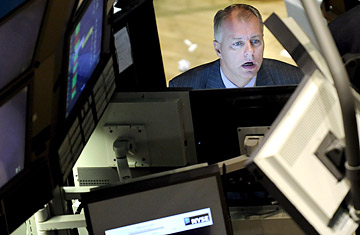
A trader works on the floor of the New York Stock Exchange
The huge stock-market losses on Thursday — a 7.3% drop in the Dow Industrials, a 7.6% decline in the S&P 500 — were just the latest in a string of traumas for investors already afraid to open brokerage statements or turn on cable TV for fear of what the news might bring. It was the seventh straight day of declines for the Dow, driving the group of blue-chip stocks below 8,600, a level not broached in five years. Since the market's high — ironically enough, exactly a year ago — the Dow has shed nearly 40%.
In times of tumult, it is only human to look for answers, and on Thursday there were plenty of story lines to account for the pain. Financial companies, the bêtes noires of the global economy, were at it again, led by Morgan Stanley, off 22% after speculation about the status of planned investment. Or perhaps the trigger was General Motors, down 31% in the wake of being put on watch for a possible credit-rating downgrade, signaling that the broader economy is on much shakier ground than everyone thought. Or could it even have been the much vilified short-sellers of financial stocks, back in the market after a 14-day ban expired Wednesday at midnight?
The problem with those answers, with most answers, is that they strive to contain cause and effect within a single trading day when the real story is much, much bigger. There is "distrust in the marketplace — and in the government's ability to handle the crisis," says Peter Cardillo, chief market economist at investment shop Avalon Partners. "That's basically feeding on itself."
In the days since Congress passed a $700 billion bailout bill to get toxic assets off banks' balance sheets and inject companies with new capital, governmental intervention in the credit crisis has continued and even grown as other countries step up their own efforts to guarantee bank accounts and bolster financial firms. In a coordinated swoop, governments around the world cut interest rates; two days ago, in the U.S., the Fed took the unprecedented step of saying it would start buying commercial paper, short-term corporate IOUs, in yet another attempt to thaw frozen credit markets.
But as necessary as those moves may be, the stock market — the most visible gauge of investor sentiment — has not been convincingly reassured. Why doesn't the news of government's quick and sweeping response stop the slide? "The news has got nothing to do with it," says Jeffrey Saut, chief investment strategist at Raymond James. "What it is, is a sequence of events that have brought us into crash mode." Saut traces that sequence of events from the nationalization of Fannie Mae and Freddie Mac, which wiped out the stockholders of those institutions, to the collapse of Lehman Brothers, which did the same to that company's investors, to the run on money-market mutual funds, to the run on Washington Mutual, to the House's unexpected failure to pass the bailout bill the first time around.
"This is a confidence game," says Saut, "and the public has lost confidence not only in financial institutions but also in their elected officials." And confidence, unfortunately, is much easier to lose than to gain.
— With reporting by John Flowers / New York
